Kiosk solutions for telco retailers: an interview with Andreas Schulz from MICHAELTELECOM
Whether it’s a touchscreen ticketing kiosk at the movies or a self-checkout solution in a supermarket, kiosk solutions are on track to become a defining aspect in our day-to-day lives. For the telecoms industry, there is a growing number of interesting emerging use cases. At NTS Retail, we are determined to keep a close eye on the market and work on introducing innovation solutions. In this context, we are cooperating with a wide range of different partners, all of which are outstanding experts in their respective fields.

One of these partners is MICHAELTELECOM AG, a German distributor with a strong footprint in the ICT industry and a unique wholistic perspective on the specific requirements of retailers in a highly information-driven environment.
Andreas Schulz, Head of Digital Signage and Brand Representative at MICHAELTELECOM AG, sat down with us to answer our questions about the opportunities created by kiosk solutions in the retail sector and his vision regarding the future of the industry.
From Digital Signage to POS and Self-Checkout
Thank you, Andreas, for agreeing to grant us some insights into the work you do at MICHAELTELECOM and its POS Unit. MICHAELTELECOM is a leading distributor and has been involved in this fascinating, innovation-driven industry since 1984. In your view, which are the most exciting developments you witnessed since you entered the industry?
AS: I have been with MICHAELTELECOM AG (MTAG) for 3 years now and I am responsible for all areas regarding POS solutions. Since we created a dedicated department, the POS Unit, we first focused on store construction and store concepts, which quickly led us to take look at the application of digital signage. Our customers signaled a clear need for interactive applications and a way to efficiently collect relevant data, as opposed to merely playing back videos and pictures on a big screen.
We took on this challenge together with our partners and made it our clear goal to consequently pursue this topic within our POS Unit. Starting with the first store concepts for grocery retailers, we consistently made our way and are now offering the full spectrum covering the conceptualization, production and implementation of self-checkout terminals as a service.
A crucial contribution within our strategy to address the public came from our PR & Marketing approach as well as from our presence at industry events, which allowed us to generate widespread attention and public recognition. Events like IFA not only helped us boost our outreach but also enabled us to secure many new customers and exciting projects.
The progress we are witnessing at our POS Unit is amazing. As of now, we are proud to count more than 30 partners and vendors in our unit and are excited to have more than 15 ongoing projects.
Among our most intense projects is the VR eKiosk, which we designed and implemented together with NTS Retail, Pyramid, Isaria and Booker. The first pilot rollout for this project started on July 13th. The exciting part of this project is not just the self-checkout feature, but the possibility to authenticate and verify the user’s identity directly at the kiosk. Combined with the sale of prepaid vouchers (e.g. Paysafe Card) and event tickets, the solution offers a complete approach. In order to enable these processes, the kiosk makes use of three operating systems (Android, Windows and Linux) – a unique concept in this field.
With POS Unit, you are setting a new course in areas like retail, digital signage and POS. As an expert for digital POS solutions, digital signage and self-checkout systems, where do you see the key benefits for retailers in making use of these technologies within their stores?
AS: Clearly, a key benefit lies in addressing the customer directly, actively and interactively. Advertising promotions and analyzing the customer are essential topics in the retail industry, which will likely also create a major impact in other industries.
Stock-keeping and stock management also play an integral role and we can clearly see those aspects align with a change in customer behavior patterns. There is a trend towards ordering items within the store, a part of a process referred to as ‘mobile commerce’.
This serves not only to strengthen the position of retailers, but also to create a simpler and more pleasant experience for the individual customer. This sets the base for delivering products and services in a new and exciting way, while also enabling retailers to promote offers with a different approach.
Besides the mere usage, the integration and placement of effective advertising plays a key role, which is absolutely reliant on great content. Only if the content directly addresses the customer in a way they can understand, the product or service will be sold effectively.
From our perspective, we are looking at information as a product. Why? Information needs to be transferred to the customer successfully, just as it is the case with products. Customers need to be able to perceive and understand the presented information. This process can work sustainably if the right content is deployed. For us, the way how the customer experiences the information is key and needs to work seamlessly across all digital applications.
Mobile Commerce and the impact of COVID-19
It’s the dominant topic in 2020: How do you view the COVID-19 pandemic and its implications at MICHAELTELECOM? What are your observations thus far? How have your target markets reacted and where are they headed in addressing the issue?
AS: That is a difficult question as, after all, we are all facing this matter with a degree of uncertainty. COVID-19 had an impact on our main business channels, but we made it through in good shape and were able to address the situation adequately with our wide range of goods. Apart from webcams, notebooks, headsets, etc. many mobility-driven products generated a lot of demand. All our teams, from purchasing and sales all the way to our warehouse staff, did an amazing job, which allowed us to successfully serve our customers and gain new customers despite facing Corona.
Within our POS Unit, we had to postpone the planned rollout for a bit, but we were able to benefit from the delay by introducing a couple of improvements to the VR eKiosk, test extensively and, eventually, present a very well-thought-out product.
The current situation is unique in that it generates a lot of interest for those solutions and applications within our POS Unit, which revolve around promoting consumer safety. We also expanded our product portfolio to contain additional protective solutions. Apart from masks and visors, this includes thermometers to allow for kiosk-based temperature screening or solutions to handle access control. My thoughts so far: We’ve been blessed with luck amidst all of this.
More than ever, retailers are faced with substantial change processes. Retailers of all industries, particularly in information-driven areas such as consumer electronics and telco retail, are required to re-evaluate their strategic goals. What are your recommendations in order to not just make it through the crisis, but to also come out of it stronger?
AS: I don’t see this as a threat to a single specific industry, but rather to various sectors across all industries! Of course, I don’t have an answer for all retailers, because some issues simply can’t be fixed with digital signage or store construction and design. Broadly speaking, I would love for everyone to work together on coming up with solutions and supporting each other in the process. It’s all about forming a union, just as we are intending to within our POS Unit.
In my personal view, e-commerce really has seen a big surge and is here to stay. We know it’s been a hard fight for brick-and-mortar retailers up until now and with the crisis causing a spike in usage, this new reality has been fortified. I think retailers should be looking to leverage this by relying on product marketing solutions, which empower customer autonomy. Still, all locations where human beings congregate, where they browse, wait or even just hang out, are potential locations which can be made use of, as a retailer, a restaurateur or a hotelier. To inform, to inspire and, eventually, to sell. This is where ‘mobile commerce’ takes on a new and integral role within modern retail. Digital content, combined with the right positioning and analytics working in the back, creates a new purchasing experience in the long run.
With the VR eKiosk, which was conceived by MICHAELTELECOM alongside partners such as Pyramid Computer and NTS Retail, you are providing a future-proof self-checkout solution with a wide variety of potential use cases. Where do you see this project heading? Where will consumers be able to experience this kiosk in the near future?
AS: I am very happy about this project and, for sure, my vision is to see this kiosk in locations around the globe. Its place is precisely at those spots I mentioned earlier: Wherever human beings get together, there is tremendous potential to strategically place our solution. I think of the VR eKiosk as a tool for conventions, stadiums, grocery stores, hotels, car dealerships, town centers, local governing bodies and many more.
Thanks to the modular design by Pyramid, we can adapt the kiosk in just a few steps and equip it with different hardware, thus allowing for a wide range of use cases to be made available. Combined with the adjustable software solution provided by NTS Retail, we can address many different retail business processes. In a way, we are creating a shop in the shape of a kiosk, with all the products one can imagine. We are working intensely on new ideas and additions, so keep an eye out for what we have in store!
The specifics of serving the telco industry
It’s a part of the company name: Your expertise lies within the telco industry. How can telcos benefit from the integration of self-service kiosks? Which additional revenue streams can be unlocked that way?
AS: Definitely. This expertise played a key role in the conception of the VR eKiosk. Identifying and authenticating customers without the need for a video call or a phone conversation creates a lot of opportunities. Operators are no longer required to maintain a dedicated store in order to address the consumer. Everything can be handled with a kiosk application and the issuing of products could be managed, for example, using an integrated pickup location – perhaps at locations we don’t really think of yet. If there is a great mix of cooperating parties willing to be a part of the kiosk in order to present to consumers and sell their goods, there is almost limitless potential!
Telco retail is a very specific sector, which tends to take on a trailblazing role in introducing technology-driven innovation topics to the market. Which other verticals can potentially benefit from innovative solutions in telco retail?
AS: Personally, I have a solid background in retail: First as a sales person, then as a division manager and eventually as a part of the field sales force. The store design, the customer mindset and the goal to convince the customer of the technology: I have to say, these things haven’t really changed.
Why? Because at the end of the day, it’s about presenting and showcasing devices. Even if there are live demo devices, without a proper presentation, they are ultimately just lying around. What is the reason for Apple’s astonishing success? It’s not just the iPhone as a device, it’s also about the story, the marketing, the emotions and the experience surrounding it. This, in my opinion, is the main driver for their success.
There has been little change to the stores, besides a couple of screens on the wall and a few small displays next to the devices. Great explanations, which serve to nurture the customer’s understanding for the technologies, are still scarce in my opinion. What is 5G? Why do I need that? Is a landline still relevant? What is fiber? How can I get IPTV on my screen? These basic questions still are on the consumer’s mind and it’s crucial to meet them exactly where they stand within their individual buyer’s journey.
Displaying goods, allowing the customer to experience them, providing excellent consulting and seamlessly transitioning into the sales process. Engaging customers in the long run by providing them informative content and being there for them regardless of their location and the time of day. In this day and age, I can’t rely on the customer showing up again on the following day, if I’m closing up shop at 6 pm. There has definitely been a shift in customer expectations and there is no guarantee that the great mood from today will persist during the next visit. The way to get customers into your store is with a smile and a vibrant passion for what you do. This allows you to build a lasting, positive relationship. Our goal is to bring this principle to life with our kiosk solutions, which, hopefully, will soon be there 24/7 to make the customers smile.
The VR eKiosk can already be seen in 23 locations all across Germany. You can learn more about this project on the official website or on the POS Unit website.


